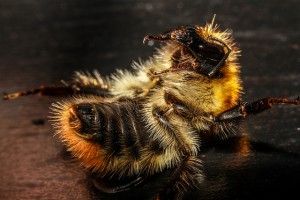Low-level exposure to neonicotinoids weakens bees’ motor skills
A recent study published in the journal Ecotoxicologyhas found that prolonged exposure to sub-lethal levels of neonicotinoid pesticides negatively affects motor skills in worker bees. Researchers fed bees four different neonicotinoid pesticides at low levels similar to what they would be exposed to if foraging on pesticide-treated crops. They then analyzed how specific behaviors including walking, flying, grooming, standing still and falling upside down changed. While bees exposed to low levels of neonicotinoids over the 24-hour period did not differ in their walking, flying, and standing behavior, they showed significant motor impairment when they tried to right themselves after falling upside down and by increasing the amount of time they spent grooming. The authors conclude that their study contributes to the growing body of evidence that exposure to field-realistic concentrations of neonicotinoids impairs honey bees in ways that affect their health and the health of their colonies.




